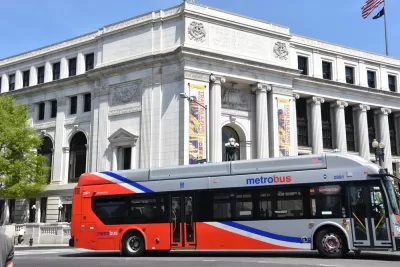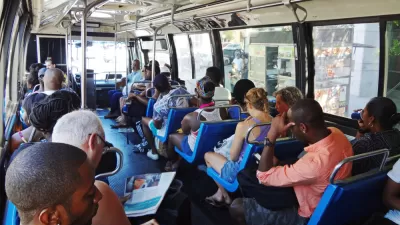Bus ridership is down in the nation's capital. Some see the issue as an opportunity to better design the service to make dollars go further.

Some officials hope to borrow lessons from Houston's redesign of its bus service to try to turn around falling ridership numbers. "It’s a strategy that is being pushed by the Washington region’s leaders, eager to see Metro seize opportunities to save money and 'right-size' service — essentially, to eliminate buses that consistently fail to run at capacity. A bus network overhaul was among the ideas recommended by former U.S. Transportation Secretary, Ray LaHood, in his recently released report on how to fix Metro’s structural and financial problems," Martine Powers writes for the Washington Post.
Why buses in D.C. are losing riders is a subject of debate, some say that now-completed train projects make that service more attractive, others point to lifestyle changes taking more people away for 9-to-5 schedules that the system was built around, and the growth of bike-share and ride-share are likely part of the equation as well.
In Houston, "officials focused on providing more frequent service throughout the day rather than clustering their efforts around the morning and evening peak periods," Powers writes. The system also moved away from a hub-and-spoke system to a grid system. "The effects on ridership are heartening: in the first year after the redesign, Saturday ridership increased by 15 percent, and Sunday service was even more popular." But some paint a less rosy picture of Houston's update, arguing that the city sacrificed equity when it cut service to areas with less ridership, which were often poor and minority.
The Houston bus redesign didn't end up saving the city money, but backers argue that boosting ridership on buses is a lot cheaper than adding transit services by any other means. They contend that, while costs went up, those dollars go further when they're spent on bus transit.

Maui's Vacation Rental Debate Turns Ugly
Verbal attacks, misinformation campaigns and fistfights plague a high-stakes debate to convert thousands of vacation rentals into long-term housing.

Planetizen Federal Action Tracker
A weekly monitor of how Trump’s orders and actions are impacting planners and planning in America.

San Francisco Suspends Traffic Calming Amidst Record Deaths
Citing “a challenging fiscal landscape,” the city will cease the program on the heels of 42 traffic deaths, including 24 pedestrians.

Defunct Pittsburgh Power Plant to Become Residential Tower
A decommissioned steam heat plant will be redeveloped into almost 100 affordable housing units.

Trump Prompts Restructuring of Transportation Research Board in “Unprecedented Overreach”
The TRB has eliminated more than half of its committees including those focused on climate, equity, and cities.

Amtrak Rolls Out New Orleans to Alabama “Mardi Gras” Train
The new service will operate morning and evening departures between Mobile and New Orleans.
Urban Design for Planners 1: Software Tools
This six-course series explores essential urban design concepts using open source software and equips planners with the tools they need to participate fully in the urban design process.
Planning for Universal Design
Learn the tools for implementing Universal Design in planning regulations.
Heyer Gruel & Associates PA
JM Goldson LLC
Custer County Colorado
City of Camden Redevelopment Agency
City of Astoria
Transportation Research & Education Center (TREC) at Portland State University
Jefferson Parish Government
Camden Redevelopment Agency
City of Claremont




























